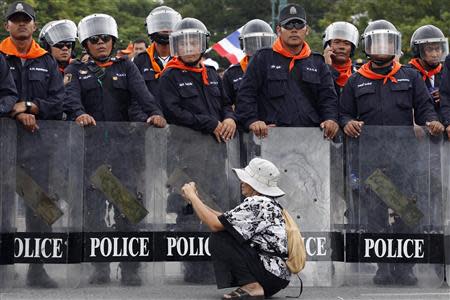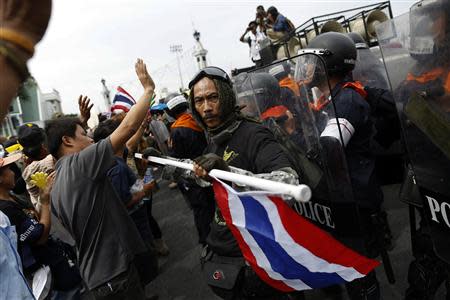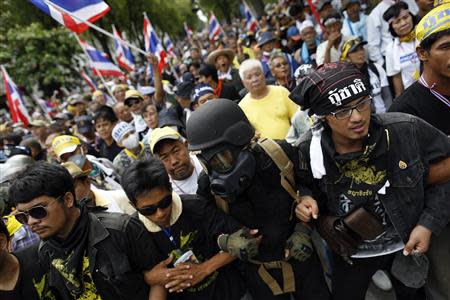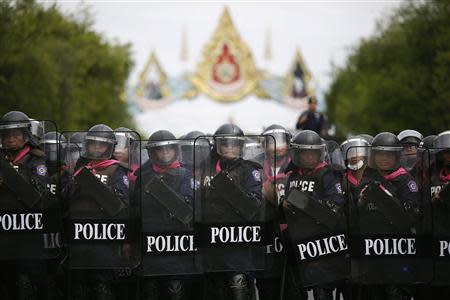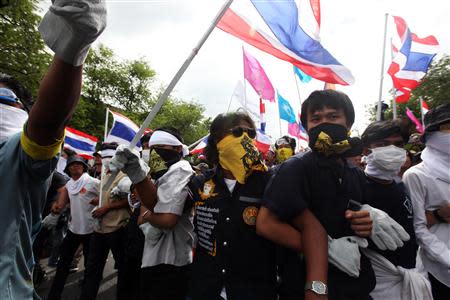Thai Senate brings forward debate on controversial amnesty bill
By Amy Sawitta Lefevre BANGKOK (Reuters) - Thailand's senate will on Friday begin deliberations on an amnesty bill that has sparked mass protests, beginning its reading of the draft law earlier than planned and stirring expectations of a decision that could end the demonstrations. Thousands of protesters rallied on Thursday in Bangkok's historic area near the United Nations' Asia-Pacific headquarters, calling for the withdrawal of the bill. Some protesters also called for the overthrow of Prime Minister Yingluck Shinawatra's populist government. "We will move deliberation of the bill to tomorrow from November 11," Senate Speaker Nikom Wairatpanij said on Thursday. Critics say the bill is aimed at bringing back Yingluck's brother, former premier Thaksin Shinawatra, from self-exile without serving jail time. He was convicted in absentia in 2008 of corruption - charges he said were politically motivated. The bill, backed by Yingluck's ruling Puea Thai Party, has been heavily criticized as a measure that would absolve all leaders and protesters involved in political unrest in Thailand since 2004 of any wrongdoing. In her first official remarks since the bill passed the lower house last week, Yingluck said on Tuesday she would leave its fate in the hands of senators. Some analysts read that as a sign she was backing down over it. In her second televised address since protesters took to the streets last Friday, Yingluck said her government would not re-introduce the draft law if it was rejected by the Senate. "This issue is over. We ask that protesters stop their activities as we are concerned this will affect investor sentiment and tourism," said Yingluck. "The state will not use force to disperse the crowd." Rights groups say the bill is unprecedented in its scope and will absolve all those responsible for instigating political violence. Thailand's anti-corruption body says this includes some 25,000 corruption cases. "KILL THE BILL" Thaksin, a billionaire former telecoms tycoon, became the first leader in Thai history to win a parliamentary majority on its own, and formed the first elected government to serve a full term, after which it was re-elected. But corruption scandals and alleged abuses of power steadily eroded his popularity among Bangkok's middle classes. That was compounded by royalist accusations that Thaksin was undermining the country's powerful monarchy, which he denied. He fled Thailand in 2008 and lives in Dubai but is widely believed to be pulling the strings of government from abroad and he remains a hugely divisive figure. The protests are a reminder of Thailand's stubborn political divisions and threaten to spark fresh violence on the streets of Bangkok after months of relative calm. Opposition leaders heading the protests in Bangkok, who don't want to see Thaksin return, have vowed to continue their occupation of the city's Democracy Monument area until the bill is thrown out. "We want the government to kill this amnesty bill and await the Senate's decision," Suthep Thaugsuban, an opposition leader and former deputy prime minister, told more than 20,000 protesters packed near the city's Ratchadamoen Avenue. Some prominent senators have indicated that the bill will likely to be rejected. The proposed amnesty would extend immunity to Thaksin's enemies, including Abhisit Vejjajiva and his former deputy, Suthep, who were charged with murder for ordering the use of live ammunition on pro-Thaksin protesters in 2010. Both Abhisit and Suthep say they want no part in the amnesty and will fight their charges in court. (Additional reporting by Aukkarapon Niyomyat; Editing by Robert Birsel)
